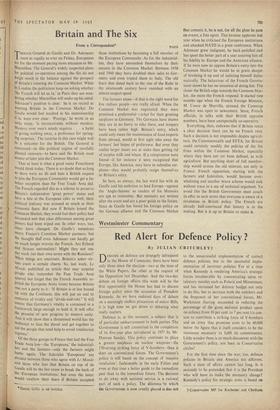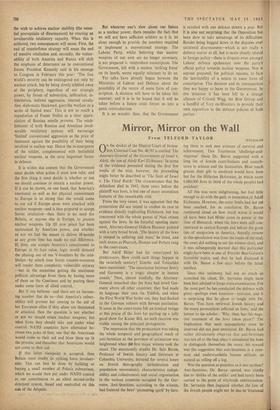Westminster Commentary
Red Alert for Defence Policy ?
By JULIAN CRITCHLEYt
DEBATES on defence are strangely infrequent in the House of Commons; there have been only three since the election—two at the time of the White Papers, the other at the request of the Opposition last December. And the two-day debate on foreign affairs this week will be the first opportunity the House has had to discuss foreign policy since the accession of President Kennedy. As we have endured days of debate on a seemingly endless procession of minor Bills, it is high time we got down to debating what really matters. Defence is, at this moment, a subject that is of particular embarrassment to both parties. The Government is still committed to the completion of its five-year plan introduced in 1957 by Mr. Duncan Sandys. This policy continues to place a greater emphasis on nuclear weapons—the 150-strong striking force of V-bombers—than it does on conventional forces. The Government's policy is still based on the concept of 'massive retaliation'; fashionable in the early Fifties and even at that time a better guide to the immediate past than to the immediate future. The decision to do away with national service is a rational part of such a policy. The dilemma 'in which the Government is now cruelly placed is due not to the unsuccessful implementation of correct defence policies, but to the successful imple- mentation of incorrect policies. For at a time when Kennedy is rendering America's strategic forces invulnerable by concentrating upon re- taliatory missiles such as Polaris and Minuteman, and has increased her defence budget not only to do this, but to increase both the numbers and the firepower of her conventional forces, Mr. Watkinson (having succeeded in reducing the percentage of the gross national product spent on defence from 10 per cent. to 7 per cent.) is con- tent to contribute a striking force of V-bombers and an army that promises soon to be 40,000 below the figure that it itself considers to be the minimum necessary to fulfil its commitments. Little wonder there is so much discontent with the Government's policy, not least in Conservative circles!
For the first time since the war, too, defence policies in Britain and America are different. Such a state of affairs cannot last long. Is it seriously to be pretended that it is the President who will have to make the necessary change? Kennedy's policy for strategic arms is based on t Conservative MP for Rochester and Chatham. the wish to achieve nuclear stability (the essen- tial prerequisite of disarmament) by creating an invulnerable retaliatory capacity. When this is achieved, two consequences will ensue. First, the end of counterforce strategy will mean the end of massive retaliation and, secondly, the vulner- ability of both America and Russia will shift the emphasis of deterrence on to conventional forces. President Kennedy said in his message to Congress in February this year: 'The free world's security can be endangered not only by nuclear attack, but by being slowly nibbled away at the periphery, regardless of our strategic power, by forces of subversion, infiltration, in- timidation, indirect aggression, internal revofu- tion. diplomatic blackmail, guerrilla warfare or a series of limited wars.' This is not so much a repudiation of Foster Dulles as a clear appre- ciation of Russian missile prowess. The estab- lishment of both Russian and American invul- nerable retaliatory systems will encourage 'limited' conventional aggression as the price of insurance against the possibility of their being involved in nuclear war. Hence the re-emergence of the soldier, complemented with battlefield nuclear weapons, as the most important factor in defence.
It is within this context that the Government must decide what action it must now take; and the first thing it must decide is whether or not we should continue to remain a nuclear power. If it can be shown, on one hand, that America's emotional as well as her physical commitment to Europe is so strong that she would come to our aid if Europe alone were attacked with nuclear weapons—and is thus prepared to accept Soviet retaliation—then there is no need for Britain, or anyone else in Europe, to possess nuclear weapons. Up till now peace has been maintained by American power, and whether or not we had the means to deliver H-bombs at any given time has made no real difference. If, then, one accepts America's commitment to Europe at its face value, logic would demand the phasing out of our V-bombers by the mid- Sixties—by which time Soviet counter-measures will render them completely vulnerable anyway —but in the meantime getting the maximum political advantage from them by basing more of them on the Continent and by putting them under some form of allied control.
But if one believes—and there are an increas- ing number that do so—that America's vulner- ability will prevent her coming to the aid of her European allies if they alone are threatened or attacked, then the question is not whether or not we should retain nuclear weapons, but what form they should take and under what control. NATO countries have alternated be- tween two poles of fear; one that the Americans would come to their aid and blow them up in the process, and .the other that Americans would not come to their aid.
If this latter viewpoint is accepted, then Britain must render its striking force invulner- able. This can best be done by building or buying a small number of Polaris submarines, which we would then put under NATO control as our contribution to an allied second-strike deterrent system, based and controlled on this side of the Atlantic. But whatever one's view about our future as a nuclear power, there remains the fact that we will not have sufficient soldiers as it is, let alone enough to provide the numbers required to implement a conventional strategy. The Labour Party, whilst believing that nuclear weapons of our own are no longer necessary, is not prepared tt reintroduce conscription. The Government, left with a nuclear 'striking force' on its hands, seems equally reluctant to do so.
Yet talks have already begun between the Ministries of Labour and Defence about the possibility of the return of some form of con- scription. A decision will have to be taken this summer; and it is to be hoped that it will be taken before a future crisis forces us into a panic reintroduction.
It is no wonder, then, that the Government is satisfied with one defence debate a year. But it is also not surprising that the Opposition has been slow to take advantage of its difficulties. Besides being bogged down in the disputes over unilateral disarmament—which is not really a defence matter at all, but is more closely related to foreign policy—there is disquiet even amongst Labour defence spokesmen over the party's official policy towards nuclear weapons. Nor is anyone prepared, for political reasons, to face the inevitability of a return to some form of conscription. This decision and its consequences they are happy to leave to the Government. In this situation it has been left to a strange alliance of Colonel Wigg, the Bow Group and a handful of Tory ex-Ministers to provide their own opposition to the defence policies of both parties.







































 Previous page
Previous page